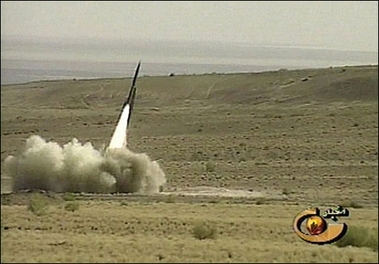Iran's supreme religious leader Ayatollah Ali Khamenei said on Monday Tehran
would pursue its nuclear program despite a U.N. Security Council demand to stop
enriching uranium by August 31 or face possible sanctions.

A TV grab taken from
Iran's state television shows the new short-range missile called Saegheh
or lightning in Farsi test-fired during the second day of the military
manoeuvers at Sistan-Baluchestan province, east of city of Zahedan near
the Pakistani border. The surface-to-surface missile has a range of
between 80 and 250 kilometers (50 and 155
miles).[AFP] |
Iran is to formally reply on
Tuesday to a trade and technology offer from major powers in return for an
enrichment halt. The deal is designed to allay Western fears Iran wants to build
atomic bombs. Tehran says its program is only for power.
"The Islamic Republic of Iran has made its decision and, in the issue of
nuclear energy, will continue its path powerfully ... and it will receive the
sweet fruits of its efforts," said Khamenei, who has the final word in Tehran.
Khamenei, whose comments were quoted on state television, did not
specifically mention enrichment but senior officials have repeated in the past
few days Iran would not be stopped.
The deputy head of Iran's Atomic Energy Organization joined the chorus.
"Considering the technical advancement of Iranian scientists, the suspension of
uranium enrichment is not possible any more," Mohammad Saeedi told Iran's Fars
News Agency.
In June, the United States, Russia, China, Britain, France and Germany
offered Iran economic and other incentives if it halted uranium enrichment,
which can yield nuclear power plant fuel or potentially atomic bombs.
President Bush said there had to be "consequences" for Iran if it ignored the
U.N. Security Council. "It's up to the international community ... to work in
concert for effective diplomacy, and that begins at the United Nations Security
Council," Bush said in Washington.
Iran has suggested it will not give a simple "Yes" or "No" to the package but
rather a "multi-dimensional" reply.
Tehran says it wants more talks. Western diplomats say Iran must halt
enrichment first. Anything short of that is likely to be viewed as a rebuff of
the offer in Western capitals.
A senior Iranian official said Iran would respond in writing, possibly
handing it to the British, French and German ambassadors in Tehran but more
likely delivering it to the European Union's Javier Solana in Brussels.
Solana, the EU foreign policy chief who handed Iran the package in June, did
not react to Khamenei's statement, saying he expected the formal reply and that
both sides were open to further contacts "under the right circumstances."
The U.S. envoy to the United Nations, John Bolton, told reporters: "The
Security Council gave them until (August 31) to complete the suspension of their
uranium enrichment activities, so they still have a few days."
U.N. INSPECTORS
In the countdown to the deadline, which Iran has denounced as illegal and
worthless, tensions have risen between Tehran and the watchdog International
Atomic Energy Agency (IAEA), diplomats familiar with IAEA operations say.
One diplomat said Tehran "created some difficulties and complications" for
IAEA inspectors visiting Iran last week to prepare for an August 31 report to
the Security Council. "The tour did not go so well," said the diplomat, without
elaborating.
Another diplomat said the inspectors were denied access to the partially
built underground section of Iran's Natanz nuclear fuel plant that they had
previously been allowed to look at.
But he said Iran's action did not appear to violate the nuclear
Non-Proliferation Treaty as it does not obligate Tehran to show inspectors sites
not handling nuclear materials.
The subterranean section is earmarked for industrial output of enriched
uranium and remains under construction.
Inspectors were able to check Natanz's pilot centrifuge plant which began
enriching uranium in April, the diplomat said.
A senior Iranian official denied inspectors were blocked. "Last week, they
visited the Natanz facility and next week they are going to visit it. This story
is totally baseless," he said.
Diplomats say Iran has also refused entry to a veteran IAEA centrifuge expert
and has cut back on multiple-entry visas that help the IAEA maintain regular
access to nuclear installations.
Iran, the world's fourth largest oil exporter, says it has the right to
enrich uranium under international treaty wording and says it will use the
technology to produce electricity.
Western diplomats say Iran must prove its aims are entirely peaceful for that
right and the IAEA says questions must be answered before it can give Iran a
clean bill on its program.
Iran may calculate that divisions in the Security Council mean it faces only
modest sanctions, such as asset freezes or travel restrictions on officials,
that it can tolerate.
Western leaders regard Iran as a risk to world peace, while Russia and China,
key trade partners of Tehran, do not.